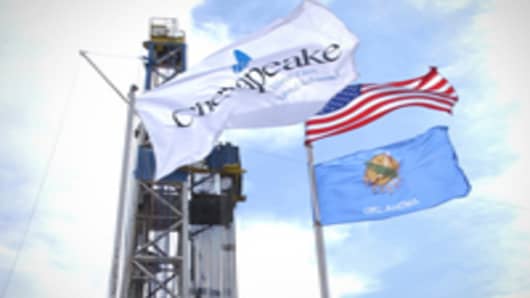Chesapeake Energy, the second-largest natural-gas driller in the U.S. and an active user of derivatives for hedging against the ebbs and flows of its core business, removed most of its 2012 derivatives positions, leaving the company naked to big dips in natural-gas futures prices just as they were headed for a ten-year low.
Late last year, the company removed most of its gas and oil hedges for 2012 and 2013, according to documents and people familiar with the matter, believing that prices were at or near a bottom.
At that time, natural-gas futures were trading just under $4. Monday morning, however, prices plummeted to roughly $2.06 per million British thermal units, their lowest level since February 2002. So far this year, Chesapeake shares are off roughly 3 percent, currently trading at about $22.
Chesapeake “is unhedged for natural gas in 2012 because we believe little further downside exists,” wrote the company in an April investor presentation. In a statement, a company spokesman added that “we are confident the market will use price to balance supply and demand for natural gas in the U.S.”
Still, going so-called naked to the strip, or having few or no hedges against where a market is currently trading, is a sharp turnaround for a company that brags in investor materials of being “the best in the industry” at natural-gas hedging.
Since 2006, Chesapeake has made an estimated $8.4 billion through derivatives trading, according to company literature. In this case, the company lifted off a batch of swap positions it had, pocketing the difference between the gas levels the swap had been pegged to and the price they were trading at last fall.
Exiting the trades was profitable, says someone familiar with the matter, even though doing so left Chesapeake without any downside protection against prices this winter.
Looking out on 2012, other natural-gas companies, like Linn Energy, Venoco , and Range Resources , have taken an opposite tack, hedging at least 75 percent of their 2012 production.
“If you go back to the very early days, there were very few companies that really hedged,” says Range investor-relations head Rodney Waller. “You weren’t a man if you hedged, you kind of wimped out,” was the perception then, he added. Now, says Waller, it’s an essential part of doing business.
For Chesapeake, removing the 2012 hedges was risky because the price of gas futures is now very likely below what it costs the company to drill for physical gas – meaning the company has no speculative hedges that will pay out as it takes what is probably a loss on its physical production.
The current position “is probably the least we’ve seen [Chesapeake] hedged on a one-year forward basis” in recent years, says Gary Stromberg, the co-head of U.S. high-yield research at Barclays and a specialist on oil and gas. The average cost of drilling for domestic natural gas is roughly $4, Stromberg says, but may be as low as $2.50 or so in easier-to-drill plays like the Marcellus Shale in the Appalachian region.
Stromberg and his colleagues believe that natural gas prices could dip below $2 in the near term, as the market prices in the fact that there’s too much supply in storage and lots more being drilled. Prices could be further damped, say analysts and industry officials, if the coming summer is a mild one and less power is needed for cooling. Over the next few years, however, he believes prices will recover as coal-fired plants and transportation fleets are replaced with natural gas and the country moves towards the production of more liquefied natural gas.
“Winter took a tropical vacation this year — cutting normal natural gas consumption…raising inventories and impacting prices,” says Jeff Mobley, Chesapeake’s head of investor relations. “The market should rebalance this summer as low-cost gas gains utility market share and is put to work in more applications across our economy.”
Follow Kate Kelly on Twitter: @KateKellyCNBC
Follow Jesse Bergman on Twitter: @JBergmanCNBC




